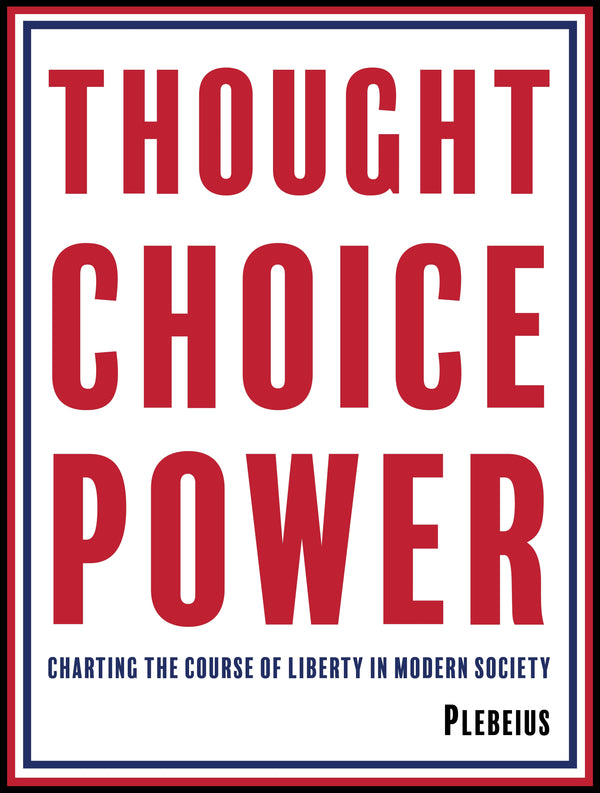
The Siren Call of States' Rights: A Warning for Modern America
Share
States' Rights is a fundamental aspect of the United States' governance framework. It serves as a mechanism for preserving an equilibrium of authority between the individual states and the federal government. However, we must approach this principle cautiously, as it has been used as cover for some of humanity’s more malevolent inclinations. The perpetuation of human slavery and the American Civil War, amongst other wrongs, have been a result of its abuse. This caution is not to undermine the importance of States' Rights – it is to remind us of its potential for misuse.
The current push for reducing federal authority and strengthening state power is not just a political debate. It is a matter of grave concern. With our socioeconomic situation being what it is, the abuse of States’ Rights today could easily lead us down a path highlighted by feudalistic structures, fascist ideologies, or some sort of hybrid system that combines elements of both. This is not a mere exaggeration. Each scenario severely impacts our nation and demands our full attention if we are to prevent such outcomes.
For our sake and humanity at large, we must take proactive measures to minimize the risks woven into States' Rights, instilling a sense of responsibility and motivation in everyone. Here are a few of the hazards to be on the lookout for:
Localized Power and Fragmentation
Throughout history, feudal systems have demonstrated how decentralized power can result in fragmented societies – how local lords have been inclined to exert significant control over their territories at the expense of centralized authority. In a modern context, transitioning towards stronger states and a weaker federal government could lead to a similar dynamic, making states more autonomous, with influential local elites backed by corporate or special interests gaining disproportionate influence over state governments. The outcome would likely be a varied patchwork of governance across the country, resulting in significant disparities in citizens' rights and access to economic resources based on geographical location. This situation echoes the fragmented territories of a feudal society and cannot be ignored.
And make no mistake, while stronger state governments would likely exacerbate economic disparities between states, expanding States’ Rights almost guarantees a multi-tiered justice system. The United States has long grappled with this issue. The Confederacy's secession, driven in large part by a desire to resist federal interference in the institution of slavery, not to mention the Jim Crow laws that followed, stands as a stark reminder of how appeals to States’ Rights can mask attempts to perpetuate injustice and inequality.
Just look around. Is it that difficult to imagine a scenario wherein states with authoritarian-inclined leaders gain control and implement policies that suppress dissent, erode civil liberties, and undermine democratic processes – all under the guise of States’ Rights? This scenario is entirely plausible, and it results in significant disparities in freedom and democracy across different states, with many inevitably becoming ever more authoritarian.
Although the context may have changed, the potential for States’ Rights arguments to be used to wear away fundamental rights and protections for citizens remains a threat today.
Fragmentation and Erosion of National Unity
History shows that fascist regimes thrive in times of national fragmentation, capitalizing on crises to solidify their power. In the U.S., a federal government constantly under assault by the forces of States’ Right will undoubtedly lead to the emergence of authoritarian figures ready to exploit crisis and chaos for their own gain. Whenever cohesive national policies are absent during chaotic times, we are left with the erosion of unity and the dangerous potential for authoritarian leaders to manipulate populist rhetoric to their advantage.
Moreover, nationalist and populist rhetoric, often marked by an "us vs. them" mentality, has surged in both the United States and Europe (Coenders et al., 2020) (Steger, 2019) (Martinelli, 2018). Leaders of these movements capitalize on public fear and anger, portraying themselves as champions of the "common people" against a corrupt establishment (Levinger, 2017). These populist leaders frequently reject immigration and connections with other nations, seeing them as threats to national identity and security (Metawe, 2020). This sentiment can lead to the erosion of democratic norms and the concentration of power in the hands of a few.
But let’s not be unfair to populist movements. In making the case for revolution, John Adams pointed out that not all populist movements are unjust or wrong-minded. Adams wrote in Novanglus Essay No. I:
Human nature itself is evermore an advocate for liberty. There is also in human nature a resentment of injury and indignation against wrong; a love of truth, and a veneration for virtue…. If the people are capable of understanding, seeing, and feeling the difference between true and false, right and wrong, virtue and vice, to what better principle can the friends of mankind apply, than to the sense of this difference?
The danger within populist movements is when its leaders are uninterested in, and the people incapable of, “understanding, seeing, and feeling the difference between true and false, right and wrong, virtue and vice.” Therefore, we should not be surprised that paramount amongst our warning signs is the rise of so-called leaders who follow a playbook Adams described as appealing “to the basest passions in the human breast – to their fear, their vanity, their avarice, ambition, and every kind of corruption”.
To address these challenges, it is critical to understand the underlying drivers of populism and to develop strategies that promote inclusive, democratic governance while addressing the legitimate concerns of marginalized groups (Berman, 2021) (Regilme, 2019) (Metawe, 2020) (Coenders et al., 2020).
Empowerment of Local Elites and Corporate Interests
In a political landscape marked by a concentration of power in state governments, corporate interests would undoubtedly focus on influencing the agendas of state legislatures. With public scrutiny diminished at the state level, corporations would find ample opportunities to advance policies that serve their interests strategically. This dynamic would strengthen local elites who hold significant economic and political power, reminiscent of the influential lords and barons in feudal societies, allowing them to consolidate their control and perpetuate a system that prioritizes their interests over those of the broader community. A cycle of privilege and influence would be created that is anything but easy to disrupt.
Furthermore, a weakened central authority could easily be exploited by state governments seeking to attract corporations through deregulation, resulting in diminished worker rights and protections, environmental degradation, and a whole host of other things. In short, states competing to attract businesses by lowering standards would further empower corporations, thereby diminishing the federal government’s role in safeguarding public welfare.
Social and Political Consequences
As mentioned, state governments running amok would create a scenario wherein citizens in different states face vastly different realities. This scenario would undoubtedly deepen political polarization as states become more entrenched in their ideological stances, leading to increased tensions between states, weakened national unity, and harder-to-address critical national issues.
As states assert their sovereignty and implement divergent policies, the federal government’s ability to maintain a coherent national agenda could be undermined (Hearn, 2015). A weaker federal government would struggle to address climate change, public health crises, and national security threats. Additionally, regional disparities in resources and prosperity could exacerbate divisions, weakening the federal government’s ability to promote social and economic cohesion and potentially contributing to the decline of American power on the global stage (Regilme, 2019).
FeudoFascism: An American Hybrid Model
As we have experienced before, elevating States' Rights inevitably leads to a divided nation where the federal government cannot effectively address national challenges. If we choose this path today, the resulting deterioration of federal authority would severely undermine the country's cohesion, leaving it dangerously exposed to both external and internal threats. Moreover, it will create a chaotic patchwork of governance that is simply unsustainable.
If we blindly elevate States' Rights, we risk creating a situation in which empowered state governments, weakened federal oversight, and increased influence from corporate and elite interests combine to form a hybrid political economy model – a model that would allow elements of feudalism and fascism to either coexist or merge throughout the country. That is, some states might develop quasi-feudal structures, with powerful local elites controlling both the economy and political systems, while others may gravitate toward authoritarianism, consolidating power under the guise of States' Rights. Or, perhaps more likely, the nation would evolve into a unique blend of feudalism and fascism that the world has not yet witnessed. Call it American FeudoFascism.
Conclusion: A Warning to Voters
A push for States' Rights to weaken the federal government is not just a historical debate – it is a current threat to the integrity of the United States as a democratic nation. Moreover, it is reasonable for some to conclude that we are already headed down this treacherous path.
There is no doubt that decentralization is attractive to many. However, the unchecked application of States' Rights today will surely result in ever-heightened inequalities and deepening divisions within our nation. It will amplify the power of the already too-powerful economic elites at the expense of the broader population, and it will pour fuel upon what is already a dangerous rise in populism seeking a strong leader. These trends – reminiscent of feudal and fascist systems – must be directly confronted.
In the end, though States' Rights is undoubtedly a fundamental principle of American democracy, voters must know the dangers of unchecked state power. Only a solid and balanced federal government can ensure that all citizens, no matter where they live, have access to the rights and protections outlined in the Constitution. To safeguard liberty, justice, and equality for all, voters must understand the risks associated with States' Rights and be prepared to reject those advocating for its broader acceptance at the ballot box.
We ought not to look back, unless it is to derive useful lessons from past errors – & for the purpose of profiting by dear bought experience – To enveigh against things that are past & irremediable, is unpleasing – but to steer clear of the shelves & rocks we have struck upon, is the part of wisdom – equally incumbent on political, as other men, who have their own little bark; or that of others to navigate through the intricate paths of life, or the trackless ocean to the haven of secury & rest. – George Washington
References
Coenders, M., Lubbers, M., & Scheepers, P. (2020, May 5). Nationalism in Europe: Trends and Cross-national Differences in Public Opinion. Cambridge University Press, 29(4), 484-496. https://doi.org/10.1017/s1062798720000526
Steger, M B. (2019, October 14). Mapping Antiglobalist Populism. Brill, 2(2), 110-136. https://doi.org/10.1163/25888072-02021033
Martinelli, A. (2018, September 14). National Populism and the European Union. Brill, 1(1), 59-71. https://doi.org/10.1163/25888072-01011000
Levinger, M. (2017, December 31). Love, Fear, Anger: The Emotional Arc of Populist Rhetoric., 6(1), 1-21. https://doi.org/10.13021/g8ncetp.v6.1.2017.1954
Metawe, M. (2020, May 20). Populism and domestic/international politics: theory and practice. Emerald Publishing Limited. https://doi.org/10.1108/reps-11-2019-0146
Berman, S. (2021, May 11). The Causes of Populism in the West. Annual Reviews, 24(1), 71-88. https://doi.org/10.1146/annurev-polisci-041719-102503
Regilme, S S F. (2019, April 12). The decline of American power and Donald Trump: Reflections on human rights, neoliberalism, and the world order. Elsevier BV, 102, 157-166. https://doi.org/10.1016/j.geoforum.2019.04.010
